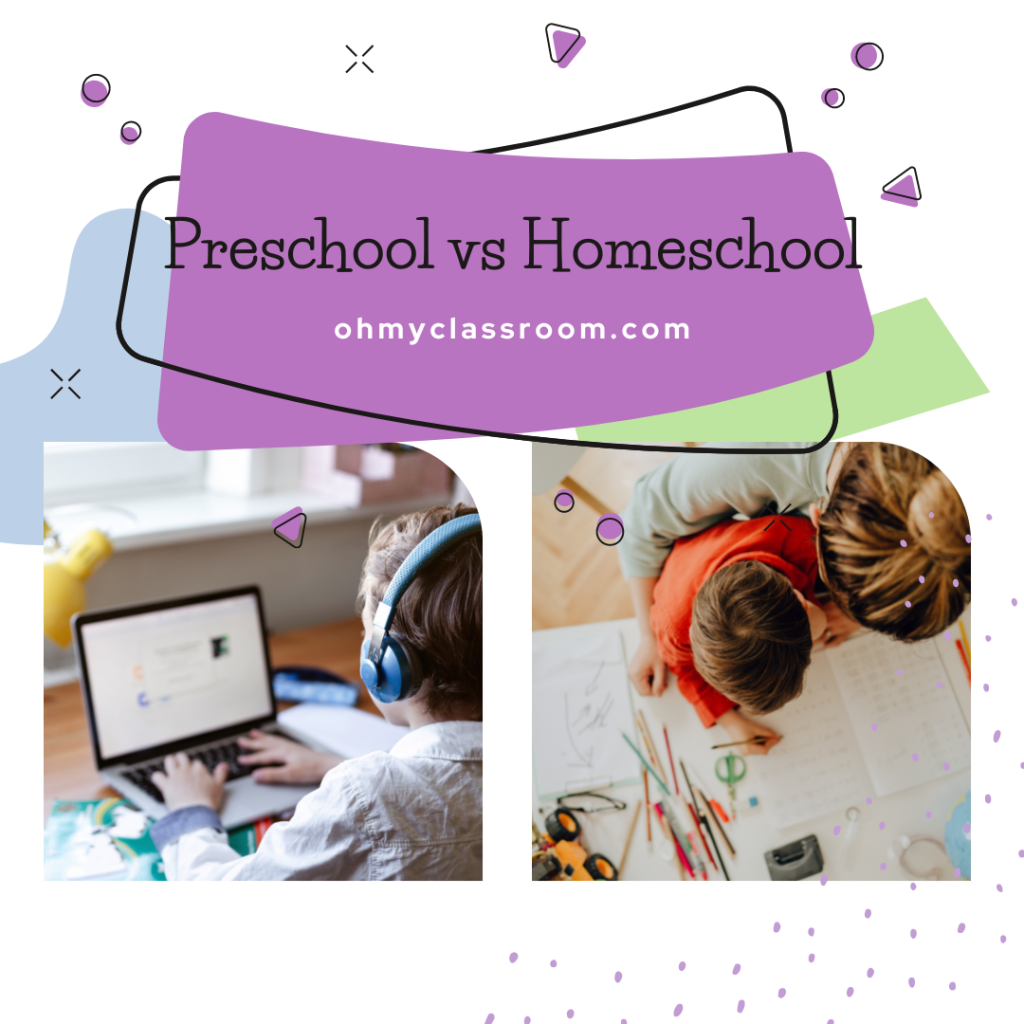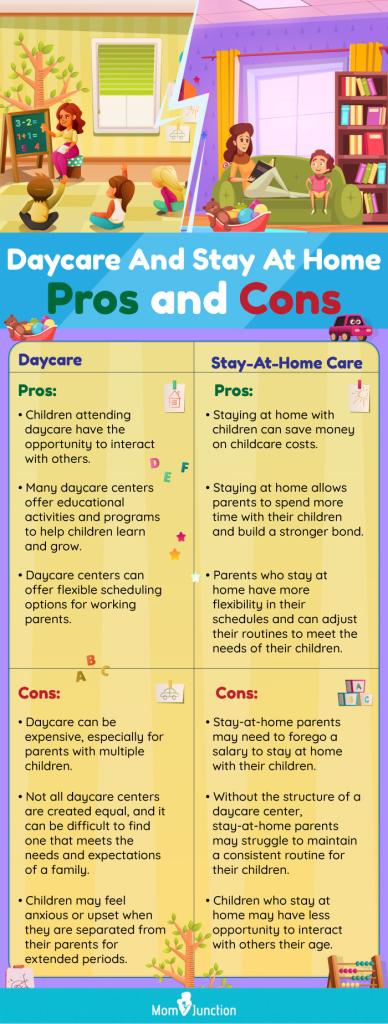The decision between sending a child to preschool or keeping them at home during their early years is a complex one and depends on various factors, including the child’s individual needs, family circumstances, and personal preferences.
Both options have their advantages, and what may be a benefit for one family may not be the same for another.
Here are some benefits of preschool vs staying home:
| Aspect | Preschool | Staying at Home |
|---|---|---|
| Socialization | Interaction with peers. | Limited peer interaction. |
| Learning Structure | Structured educational activities. | Informal, play-based learning. |
| Diversity Exposure | Exposure to diverse backgrounds. | Limited diversity at home. |
| Teacher Qualification | Trained educators. | Parent/caregiver guidance. |
| Early Education | Academic readiness focus. | Learning through play. |
| Independence Building | Promotes self-reliance. | Familiar, secure environment. |
| Routine and Schedule | Follows structured routine. | Flexible daily routines. |
| Kindergarten Prep | Prepares for formal schooling. | Less structured transition. |
| Parental Involvement | Limited due to separation. | High parental involvement. |
| Flexible Schedule | Structured daily schedule. | Flexibility in routines. |
| Emphasis on Play | Play with educational elements. | Emphasis on unstructured play. |
| Closeness to Family | Less time with immediate family. | More family bonding time. |
| Illness Exposure | Increased illness exposure. | Reduced illness risk. |
| Customized Learning | Standard curriculum with some flexibility. | Tailored to interests. |
| Cost | Tuition and fees may apply. | Fewer associated costs. |
| Stress Level | Daily routine, potential drop-off stress. | More relaxed and flexible. |
Related: Learning Centers in Early Childhood Classrooms

Understanding Preschool

Preschool refers to an educational setting for children aged 3 to 5 years old.
It is designed to prepare children for their future education by introducing them to basic academic and social skills.
Preschools are typically structured and provide children with a routine and structured environment, helping them to develop discipline and independence.
Related
How to Setup a PreSchool Classroom (Design, Layout with Examples)
are preschool teachers real teachers?
Advantages of Preschool

Socialization
One of the main benefits of preschool is that it provides children with opportunities to socialize with their peers.
Children who attend preschool will have the chance to interact with others their own age, learning important social skills such as sharing, cooperation, and communication.
This is especially important for children who are shy or have difficulty socializing.
Related: 5 Important Preschool Development Stages
Early Exposure to Academics:
Preschools also provide children with their first exposure to academics.
Children can start to develop pre-reading, pre-writing, and pre-math skills, which will help them succeed in their future education.
The curriculum at preschools is designed to be age-appropriate, making it an enjoyable and engaging experience for children.
Related: Why is Preschool Important?
Preparing for school
Preschool also prepares children for the structure and routine of a formal school setting.
Children will become familiar with a daily schedule and learn how to follow rules and routines. This makes the transition to formal school easier for children and their parents.
Building confidence
Preschool provides children with opportunities to develop their confidence and independence.
Children are encouraged to try new things, solve problems, and make decisions, helping them to become more confident and self-assured.
Source: https://www.cadence-education.com/blog/parents-corner/benefits-of-preschool-vs-staying-home/
Understanding Home Schooling
Staying at home learning refers to children being educated at home by their parents or other family members.
This approach allows children to learn at their own pace and provides a more personalized learning experience.
Staying at home also eliminates the need for parents to find and pay for childcare.
Advantages of Staying at Home Learning
Customized learning:
Staying at home learning provides children with a customized learning experience. Parents can tailor their child’s education to their individual needs, interests, and learning styles.
This allows children to learn at their own pace and focus on what is important to them.
Flexibility:
Staying at home learning also provides parents and children with the flexibility to create their own schedule. This is especially important for families with busy schedules or who travel frequently. Children can learn at their own pace and take time off when needed.
Related: Essential Preschool Supply List for Parents
Bonding:
Staying at home learning provides families with the opportunity to bond and spend quality time together. Parents can get to know their children better and help them develop important life skills, such as responsibility and self-discipline.
Savings:
Staying at home learning can also be more cost-effective than preschool, as parents do not need to pay for tuition or transportation costs.
Source: https://www.healthline.com/health-news/how-big-of-a-difference-does-preschool-make-for-kids
Some Considerations when making a decision
Family dynamics
It’s important to consider your family dynamics when deciding whether to send your child to preschool or have them stay at home for learning.
Some families may not have the resources or support system to provide a structured learning environment at home, while others may have a stay-at-home parent who is able to provide the necessary education and support.
Child’s personality and needs:
The personality and needs of your child should also be taken into consideration when making a decision. Children who are outgoing and thrive in social situations may benefit from the socialization opportunities offered by preschool.
On the other hand, children who are introverted or have special needs may be better served by a more personalized learning environment at home.
Future goals:
It’s important to consider your long-term goals for your child’s education when making a decision. If you’re looking to provide your child with a strong foundation for their future education, preschool may be a good option.
However, if you’re looking for a more personalized education that allows for flexibility, staying at home for learning may be the best choice.
Conclusion:
In conclusion, both preschool and staying at home learning have their advantages and disadvantages.
The decision of where to start your child’s education will depend on your individual family dynamics, your child’s personality and needs, and your long-term goals for their education.
It’s important to consider all of these factors and weigh the pros and cons before making a decision.
Regardless of the choice you make, your child’s education and future success will depend on the love and support you provide them.
References:
- Barnett, W. S. (1995). Long-term effects of early childhood programs on cognitive and school outcomes. The Future of Children, 25-50.
- Gormley, W. T., Gayer, T., Phillips, D., & Dawson, B. (2005). The effects of universal pre-K on cognitive development. Developmental Psychology, 41(6), 872-884.
- Reynolds, A. J., Temple, J. A., Robertson, D. L., & Mann, E. A. (2002). Long-term effects of an early childhood intervention on educational achievement and juvenile arrest: A 15-year follow-up of low-income children in public schools. JAMA, 285(18), 2339-2346.
